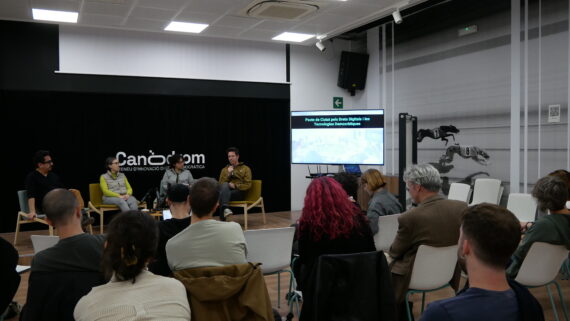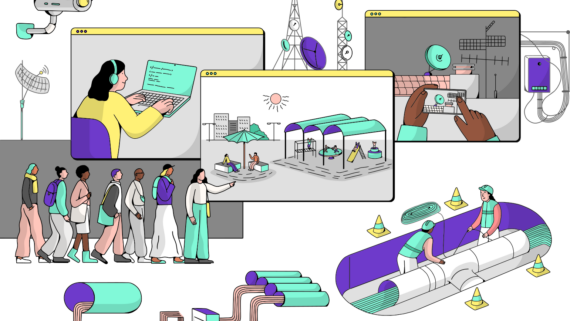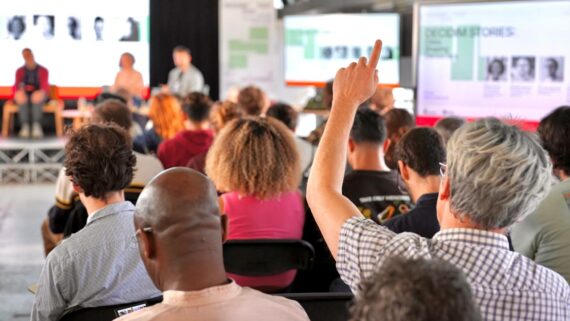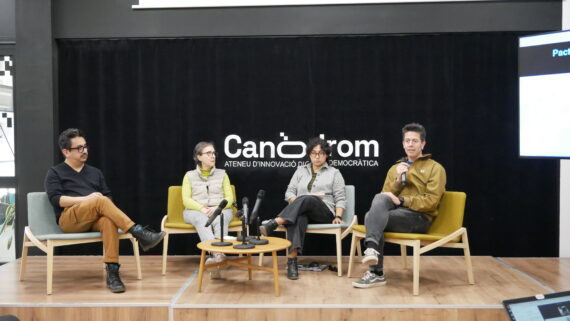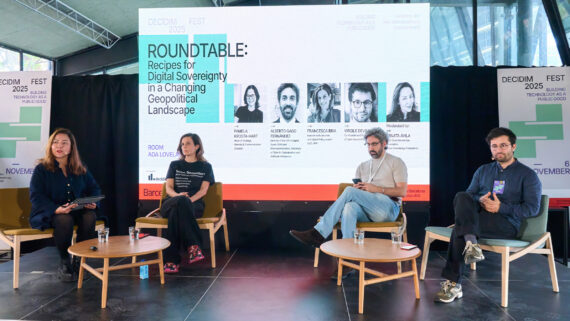On April 27, 2023, the International Day of Girls in ICT is celebrated under the motto “digital skills for life”. Last March 3, Canòdrom and DigitalFems organized a new day of the cycle of music and technology in the stands. We spoke to prominent feminist activists linked to the world of technology and music.
What if artificial intelligence produced the music? How would it be How is it that more and more men are listened to and fewer women, since these are almost half of the users? In a world where technology and algorithms surround us from all sides, last March 3 Canòdrom and DigitalFem, through EllESmusic, we organized a new day of the music and technology cycle in the stands.
On the 8M 2023, prominent feminist activists linked to the world of technology and music participated. The artists reflected on what is happening in the music and technology industries and pointed out solutions to avoid greater biases. And the most present color of digitization is clear : the technology is developed by cis, white and non-disabled men.
Visualizing the existing gender gap in the music and technology industry
Music and technology make a perfect match in terms of creative synergies, but they also create a deep gender gap. According to the report 'Women in technology' (2022) by DigitalFems, a resident project at the Canòdrom, 78% of the 448 women who participated feel capable of facing complex technological developments, but almost half have ever given up a technical position for not having received support. EllESmusic acts as a counterpoint to thinking about artistic creation and the process of automated predictions by questioning the AI brogrammer.
The third edition of the music and technology concerts in the stands, brought together artists, musicians and digital culture professionals at the Canòdrom. One of the activities was a discussion panel where Thais Ruiz de Alda, founder of DigitalFems, participated; Cristina Checa, technologist and member of the musical duo Desert; Ana Montserrat, director, screenwriter, producer and scientific popularizer; Lucía Martínez Prado, founder and director of Break-event; Laura Benitez, philosopher and university teacher; Mireia de Gràcia and Antònia Folguera, artist and curator of digital culture, as moderator. In addition, attendees enjoyed a duo concert by singer-songwriter Núria Duran alongside guitarist Deiv and a DJ session by AWWZ in a b2b with artificial intelligence.
According to UNESCO, 7 million people work in the ICT sector, but only 30% are women. Creating an environment that empowers and encourages girls, young women to consider the possibility of pursuing studies and careers in the field of information and communication technologies is the goal pursued by the International Day of the Girl initiative in TIC, which is held every fourth Thursday in April. This 2023, on April 27.
Breaking the loop, hacking the algorithms
More and more women are working to break existing algorithmic biases and gender stereotypes in the technology and music industry. «The technologies are not new. The new thing about AI is the hyper-accelerated temporality to which these new systems expose us and the impact this has on our productivity», adds Laura Benítez, PhD in philosophy.
In the music industry, female artists have it more complicated when it comes to reaching the audience just because they are women, despite the fact that almost half of the people users of a music application are women. For Thais Ruiz de Alda, founder of DigitalFems, «needs the will to apply the gender perspective to musical metadata to break the existing gap in the algorithms».
The data shows that there are only 2% of girls producing music, and Gemma AWWZ is one of them. DJ and producer recognized nationally and internationally, works with artificial intelligence live and direct. Recently, he collaborated with a UPC group to create a virtual DJ that works with AI and takes into account the gender perspective and is fed by thousands of YouTube comments.
According to the study “Break the Loop: Gender Imbalance in Music Recommendations” (2021), the average position of female artists in recommendation systems is much lower than that of their male colleagues. These algorithms are trained on data and measures are needed to try to prevent them from reproducing existing patterns. How to counter them? The first step is education to hack the systems that want absolute control, says Cris Checa, technologist and member of the musical duo Desert.

